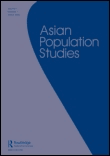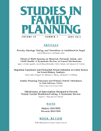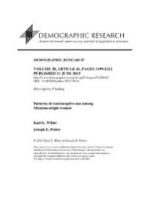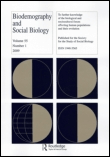
Demografie
metrics 2024
Illuminating the path of demographic research and policy.
Introduction
Demografie is a distinguished academic journal published by the Cesky Statistical Office in the Czech Republic, serving as a vital platform for scholars and practitioners interested in the multifaceted field of demography. Established in 1976 and consistently contributing until 1999, with a renewed focus from 2014 to 2024, this journal engages with critical issues such as population dynamics, migration patterns, and socio-economic factors influencing demographic changes. For its impactful research contributions, it holds a Q3 category ranking in Demography for 2023, with a Scopus rank of #89 out of 139 in the Social Sciences category, reflecting its credibility and relevance in the field. Although it operates under traditional access, its insightful articles and comprehensive analyses remain valuable resources for researchers, professionals, and students eager to deepen their understanding of demographic trends and policies. The journal's commitment to advancing demographic knowledge makes it an essential read for those navigating the complexities of population studies.
Metrics 2024
 0.26
0.26 0.90
0.90 0.70
0.70 10
10Metrics History
Rank 2024
Scopus
IF (Web Of Science)
JCI (Web Of Science)
Quartile History
Similar Journals

DEMOGRAPHY
Bridging theory and practice in population research.DEMOGRAPHY is a prestigious, peer-reviewed journal published by DUKE UNIVERSITY PRESS, dedicated to advancing the field of demography through scholarly research and critical discourse. With an esteemed Q1 ranking in Social Sciences and an impressive Scopus rank of #10 out of 139 in the category, this journal holds a 93rd percentile status, reflecting its significant impact on the academic community. Covering a wide range of topics related to population studies, including fertility, mortality, migration, and demographic change, DEMOGRAPHY serves as a vital resource for researchers, professionals, and students alike. Since its inception in 1964, it has provided a platform for innovative studies and influential articles that address both theoretical frameworks and applied research. Although not an open-access journal, it ensures that its contributions reach a global audience while maintaining rigorous academic standards. Engage with DEMOGRAPHY to explore and contribute to the dynamic discussions shaping our understanding of human populations in a complex world.

Asian Population Studies
Navigating the Intricacies of Population Growth and MigrationAsian Population Studies is a distinguished journal published by Routledge Journals, Taylor & Francis Ltd, delivering comprehensive insights into the vibrant field of demography. Since its inception in 2006, this peer-reviewed journal has consistently provided a platform for high-quality research that enhances our understanding of population dynamics in Asia. With an impressive category ranking of Q2 in Demography for 2023, and holding a notable position as 35th out of 139 within the Scopus ranking, it is recognized for its significant contributions to the field, appealing to researchers, scholars, and professionals alike. The journal covers a diverse range of topics, including population growth, migration patterns, and socio-economic factors influencing demographic changes across Asian countries. Although it does not offer open access, Asian Population Studies remains a vital resource for those seeking to explore demographic trends and their implications for policy and practice in one of the most populous regions of the world. With a commitment to academic excellence, it continues to serve as an essential tool for anyone engaged in demographic research and study.

European Journal of Population-Revue Europeenne de Demographie
Connecting Scholars to the Heart of DemographyWelcome to the European Journal of Population-Revue Europeenne de Demographie, a premier scholarly publication dedicated to advancing the field of demography. Published by Springer since 1985, this journal has established itself as a vital resource for researchers, professionals, and students interested in population studies, evidenced by its Q1 ranking in Demography for 2023 and a notable Scopus ranking within the top 20% of its category. With an ISSN of 0168-6577 and an E-ISSN of 1572-9885, the journal provides a platform for high-quality, peer-reviewed research, contributing to the understanding of population dynamics and demographic trends across Europe and beyond. Although currently not open access, the journal ensures broad mobility of knowledge through diverse access options, aspiring to bridge theoretical insights and practical applications crucial for policy-making and societal engagement. Join us in exploring the intricate tapestry of demographic data as we examine pressing issues such as migration, fertility, mortality, and population aging in an ever-evolving global context.

STUDIES IN FAMILY PLANNING
Advancing knowledge in family planning and reproductive health.STUDIES IN FAMILY PLANNING, published by WILEY, is a renowned journal that serves as a critical resource in the fields of Demography and Social Sciences. With an impressive Q1 ranking in both categories, it is recognized for its high impact and influential contributions to the understanding of family planning dynamics, reproductive health, and population studies. The journal has published scholarly articles since 1970, reflecting its long-standing commitment to advancing knowledge and research in these important areas. Currently holding a rank of #27 out of 139 in Demography on Scopus, the journal's 2023 impact factor underscores its influential role in shaping policy and practice worldwide. Though it operates under a subscription model, it is readily accessible to members of the academic community, including researchers, professionals, and students dedicated to improving family planning systems and socio-demographic studies.

Spatial Demography
Advancing Insights through Spatial AnalysisSpatial Demography is a vital academic journal published by Springer International Publishing AG, focusing on the intersection of spatial analysis and demographic research. With its ISSN 2364-2289 and E-ISSN 2164-7070, this journal aims to advance understanding of population dynamics through innovative methodologies and spatially explicit data, offering a platform for researchers, professionals, and students engaged in demography, geography, and urban studies. While it does not currently operate under an open access model, Spatial Demography maintains a rigorous peer-review process to ensure high-quality publications that contribute significantly to the field. Given the growing importance of spatial data in demographic research, the journal serves as an essential resource for those looking to explore how spatial attributes influence demographic processes and patterns worldwide. The official address of the publisher is Gewerbestrasse 11, Cham CH-6330, Switzerland.

Demographic Research
Innovating research for a deeper demographic understanding.Demographic Research is a leading journal in the field of demography, published by the prestigious Max Planck Institute for Demographic Research. Available in both print and electronic formats (ISSN: 1435-9871, E-ISSN: 1435-9871), this open-access journal has been a valuable resource for demographers and social scientists since its inception in 1999. With a commendable impact factor and ranked Q1 in its category, the journal demonstrates a significant commitment to advancing our understanding of demographic trends and their implications across contexts. Hailing from Germany, the journal's rich international perspective adds depth to its studies, making it a vital platform for innovative research. Researchers, professionals, and students are encouraged to engage with its wealth of articles that not only document demographic changes but also offer insights critical for policy-making and social planning. The journal's broad scope encompasses diverse themes, providing a comprehensive overview of the demographic shifts that shape societies today.

Biodemography and Social Biology
Pioneering Research at the Intersection of Biology and AnthropologyBiodemography and Social Biology is a distinguished academic journal published by Routledge Journals, Taylor & Francis Ltd, focusing on the intersections of demographic and biological sciences. With its ISSN 1948-5565 and E-ISSN 1948-5573, this journal contributes significantly to the fields of anthropology, demography, and social biology, making it an essential resource for researchers and professionals alike. The journal has consistently achieved high rankings, notably placing in Q2 in both anthropology and demography, underlining its impact in these critical areas of study. Although it does not provide Open Access options, the journal's rigorous peer-review process ensures the highest quality of academic discourse and research dissemination. Covering a wide scope of topics related to human population dynamics, health, and behavior, Biodemography and Social Biology serves as a vital platform for advancing knowledge and understanding of the biological and social factors influencing human societies since its inception in 1990. Researchers, students, and professionals are invited to contribute their findings and insights, enriching the academic conversation that this journal fosters.

JOURNAL OF POPULATION RESEARCH
Transforming data into impactful demographic knowledge.JOURNAL OF POPULATION RESEARCH, published by Springer, is a premier journal dedicated to advancing the field of demographic studies. With a focus on research that addresses the complexities of population dynamics, this journal serves as a vital platform for scholars, practitioners, and students alike. It holds a commendable Q2 ranking in the Demography category for 2023, underscoring its influence and commitment to quality research. The journal spans a rich convergence of knowledge from 2005 to 2024, covering key developments and emerging trends in population research. Although it operates under a traditional access model, its impact continues to resonate throughout the academic community, highlighting the importance of robust demographic analysis in policy and planning. By fostering insightful discussions and providing access to groundbreaking studies, the JOURNAL OF POPULATION RESEARCH remains an essential resource for those eager to deepen their understanding of population issues.

POPULATION RESEARCH AND POLICY REVIEW
Illuminating Population Trends and Policy SolutionsPopulation Research and Policy Review is a prestigious journal published by Springer, specializing in the fields of demography and policy analysis. Established in 1982, this journal has developed a significant reputation within the academic community, currently holding a Q1 ranking in Demography and a Q2 ranking in Management, Monitoring, Policy, and Law as of 2023. With a robust Scopus ranking of #34 out of 139 in Demography and a readership that spans multiple disciplines, this journal serves as a critical platform for researchers, professionals, and policymakers to disseminate their findings and insights related to population dynamics and policy implications. Although not an open-access journal, Population Research and Policy Review provides vital research that influences both theoretical frameworks and practical applications in social sciences and environmental management. The journal’s ongoing commitment to high-quality, peer-reviewed scholarship makes it an indispensable resource for those seeking to understand and address contemporary demographic challenges.

JOURNAL OF POPULATION ECONOMICS
Illuminating the Links Between Population Change and Economic GrowthThe JOURNAL OF POPULATION ECONOMICS, published by SPRINGER, stands as a leading peer-reviewed journal in the fields of demography and economics. Established in 1988, this esteemed journal offers a platform for high-quality research that probes the intricate relationships between population dynamics and economic phenomena. With its impressive Q1 quartile ranking in both Demography and Economics and Econometrics for 2023, the journal is recognized as a vital resource for scholars and practitioners alike, reflecting its rigorous standards and impact in the academic community. Its Scopus rankings position it within the top tiers of social sciences, making it an essential read for those engaged in demographic and economic research. Although the journal does not currently adopt an open access model, its esteemed reputation and continuous publication until 2024 ensure relevant and up-to-date findings contribute meaningfully to scholarly discourse. At its core, the JOURNAL OF POPULATION ECONOMICS aims to bridge theoretical insights and empirical findings, fostering an understanding of how population changes influence economic outcomes and vice versa.